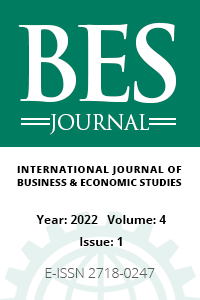Şirketlere Özgü Haberler mi Hisse Senedi Tavsiyeleri mi? Borsa İstanbul Üzerine Bir Uygulama
Bu çalışmanın amacı, yatırımcıların şirketlere özgü haberlere ve piyasa yapıcıların verdikleri hisse senedi tavsiyelerine dayanarak aşırı getiri elde edip etmeyeceklerini araştırmaktır. Hisse senetlerinin haber ve tavsiyelere tepkisini test etmek için, ilk olarak, Ocak 2019 ve Nisan 2020 dönemi için olay çalışması yöntemi kulanılmıştır. Bu kapsamda, Borsa İstanbul’da işlem gören hisse senedi getirileri ve piyasa göstergesi olarak BIST 30 endeksi kullanılmıştır. Araştırmanın sonuçları, pozitif şirket haberlerinin hisse performansına önemli bir etkisinin olmadığını ancak yatırımcıların şirketlere özgü yayınlanan negatif yönlü haberlerden etkilendiklerini göstermektedir. Araştırmanın sonuçlarını genişletmek ve karşılaştırma yapabilmek için, şirketlere özgü haberlerin yayınlandığı gün piyasa yapıcıların verdikleri tavsiyelerin hisse senedi getirileri üzerinde bir etkisinin olup olmadığı regresyon analizi yardımıyla araştırılmıştır. Buna göre, piyasa yapıcıların verdikleri tavsiyelere dayanarak karar alan yatırımcıların aşırı getiri elde ettikleri gözlemlenmiştir. Ayrıca hisse senetleri, pozitif haberlere kıyasla negatif haberlere daha çok tepki vermektedirler. Bu sonuçlar etkin piyasa hipotezinin varsayımları ile uyuşmamaktadır.
Anahtar Kelimeler:
Hisse Senedi Tavsiyeleri, Şirketlere Özgü Haberler, Aşırı Getiriler
Firm-Specific News or Stock Recommendations? Evidence from the Borsa Istanbul
The aim of this study is to examine whether investors can earn abnormal returns based on firm-specific news in general, and stock recommendations given by market makers in particular. To measure the stock market reaction, at first, the event study is conducted for pre- and post-event windows covering the periods from January 2019 to April 2020. In this context, stock returns traded on Borsa Istanbul and BIST 30 Index as market indicator are used. The results indicate that while positive firm-specific news do not provide valuable information, investors are affected from negative news during post-event days. Then, to enchance and compare the results, a regression analysis is estimated to examine whether the stock recommendations have an additional effect on stock returns at the day of news announced. This analysis has provided that investment decisions based on the recommendations of the market makers would generate abnormal returns to investors. In addition, the market reacts stronger to negative news, contrary to the positive ones. These results are inconsistent with the assumptions of efficient market hypothesis.
Keywords:
Stock Recommendations, Firm-Specific News, Abnormal Returns,
___
- Boudoukh, J. and R. Feldman and S. Kogan and M. Richardson (2013). Information, Trading and Volatility: Evidence from Firm-Specific News, 1-47.
- Brown, S. J. and J. B. Warner (1985). Using Daily Stock Returns: The Case of Event Studies. Journal of Financial Economics, 14, 3-31.
- Erdoğan, O. and D. Palmon and A. Yezegel (2008). The News of No News in Stock Markets.http://ssrn.com/abstract=1860181, 1-33.
- Erdoğan, O. and D. Palmon and A. Yezegel (2010). Performance of Analyst Recommendations in the Istanbul Stock Exchange.http://ssrn.com/abstract=1003745.
- Eyüboğlu, K. andH. İ. Bulut (2016). Şirketlere Özgü HaberlerinHissePerformansınaEtkisi: Bist-30 ŞirketleriÖrneği. Uluslararası İktisadi ve İdari İncelemeler Dergisi, 16, 113-138.
- Eyüboğlu, K. and H. İ. Bulut (2017). The Effects of Business Magazine Recommendations on the Stock Prices in Turkey: Case of Para. Anadolu University Journal of Social Sciences, 17 (1), 109-121.
- Fama, E. F. (1965). Random Walks in Stock Market Prices. Financial Analysts Journal, 21(5), 55-59.
- Jory, S. R. and T. N. Ngo and D. Wang and A. Saha (2015). The Market Response to Corporate Scandals Involving CEOs. Applied Economics, 47 (17), 1723–1738.
- Keown, A.J. and J. M. Pinkerton (1981). Merger Announcements and Insider Trading Activity: An Empirical Investigation. The Journal of Finance, 36 (4), 855-869.
- Kıymaz, H. (2001). The Effects of Stock Market Rumors on Stock Prices: Evidence froman Emerging Market. eJournal of Multinational Financial Management, 11, 105-115.
- Ostrovsky-Berman, E. (2020). Can CEOs Change the Market Perception by Giving Interviews to the Media?.Journal of Behavioral Finance, ISSN: 1542-7560, 1-9.
- Özsu, H. H. (2015). Empirical Analysis of Herd Behavior in Borsa Istanbul. International Journal of Economic Sciences, 4(4), 27-52.
- Palmon, D. and E. F. Sudit and A. Yezegel (2009). The Value of Columnists’ Stock Recommendations: An Event Study Approach. Review of Quantitative Finance and Accounting, 33(3), 209-232.
- Soon, Y. C. (2010). News Which Moves the Market: Assessing the Impact of Published Financial News on the Stock Market. Master Thesis, 1- 61.
- Tetlock, P. C. and M. Saar-Tsechansky and S. Macskassy (2008). More Than Words: Quantifying Language to Measure Firms‟ Fundamentals. The Journal of Finance, 53 (3), 1437-1467.
- Tetlock, P. C. (2007). Giving Content to Investor Sentiment: The Roleof Media in the Stock Market. The Journal of Finance, 52 (3), 1139-1168.
- Yazici, B. and G. Muradoğlu (2002). Dissemination of Stock Recommendations and Small Investors: Who Benefits? Multinational Finance Journal, 6(1), 29–42.
- Zou, G. and L. Han and J. G. Meng and C. Wu (2019). Asymmetric Effect of Media Tone on IPO Underpricing and Volatility. Emerging Markets Finance and Trade, ISSN:1540-496, 1-17.
- ISSN: 2718-0247
- Yayın Aralığı: Yılda 2 Sayı
- Yayıncı: Mesut DOĞAN
Sayıdaki Diğer Makaleler
İş Performansı ve Performans Değerleme Sistemi Üzerine Kavramsal Bir Değerlendirme
Türkiye'de Dijital Politik Pazarlama
Lüks Tüketim Algisi ile İçsel ve Dişsal Değerler Arasindaki İlişki: Uşak İli Örneği
Şirketlere Özgü Haberler mi Hisse Senedi Tavsiyeleri mi? Borsa İstanbul Üzerine Bir Uygulama
Hilal Hümeyra ÖZSU, Neda HASHEMİ, Halime Büşra ERDÜZEN YILMAZ
